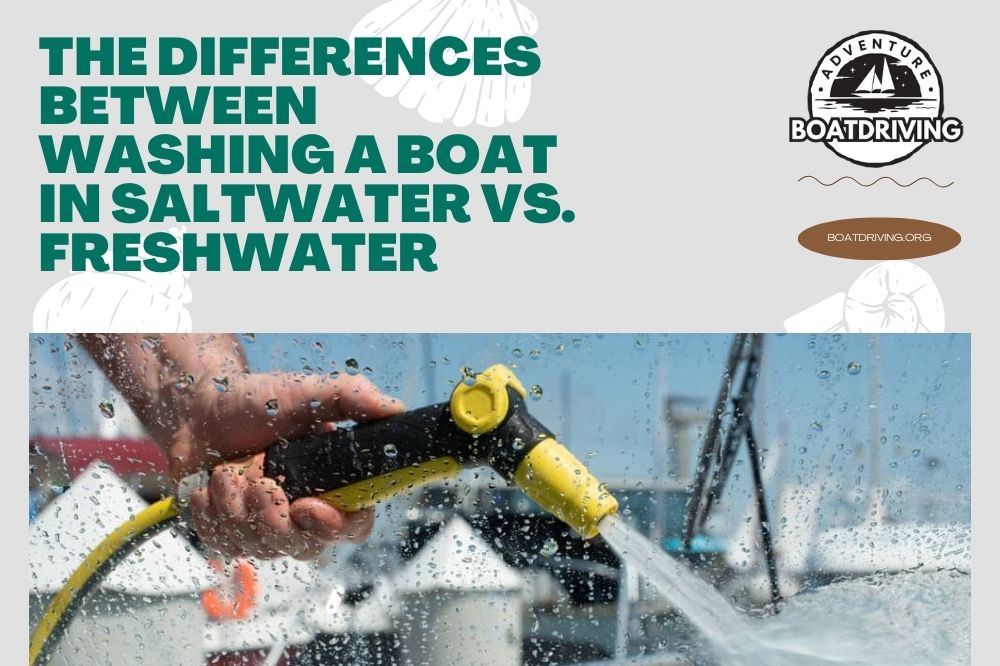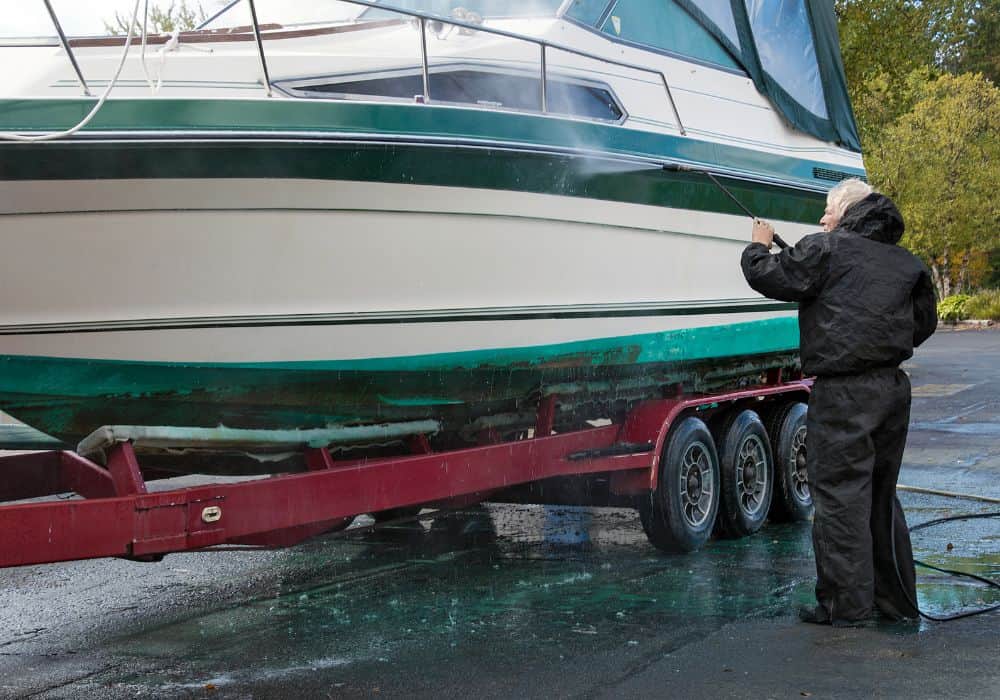Salt is a mineral that seemingly makes life better on all fronts: It improves the flavor of food, makes snow melt faster on roads, and is essential for crafting homemade ice cream.
Unfortunately, it’s also quite destructive, especially when boats are the victims. Nearly every material that makes up a boat is susceptible to salt corrosion, which is why boats that live in saltwater must have additional protective measures and get deep cleans more often than boats that exclusively travel in freshwater.
All boats need cleaning, however, and opting to use freshwater does pose its own set of challenges, too. Without proper cleaning, fiberglass will fade and crack, wood will darken and rot, metal will dull and rust, and parts will fail prematurely. All the while, the boat will deliver poorer performance, having a more difficult time cutting through the water and responding to commands, and the motor can and will fail.
The Challenges and Risks of Saltwater
Make no mistake: Saltwater is far more harmful to boats than freshwater, and it will corrode metal five times as fast. In order to combat such issues, saltwater boat manufacturers include some intelligent upgrades, such as:
- Closed Cooling Systems:Use internal coolant rather than the surrounding water to cool the engine
- Mercathode Systems:Use a tiny electrical current running through the engine to prevent corrosion
- Hull Design: More of a deep V shape on saltwater boats because they tend to go into deeper waters
- Rust-Resistant Materials: Stainless steel and aluminum
- Bottom Paint: Typically with active ingredients that fight corrosion, such as copper or zinc.
Even with these extra measures, however, saltwater can still lead to pitting, fading, and rusting within a few days if it’s not cleaned off immediately after a boating session, and the problems with saltwater do not stop there.
Electrical components can accumulate salt, which will eat through wires and connections. In addition, marine life, such as barnacles, can reduce performance and cause damage to your boat. Of even bigger concern are invasive and non-native species, which boats can spread after traveling across long distances.
The Challenges and Risks of Freshwater
Even freshwater will cause damage over time, even if it doesn’t do so fast or as severely as saltwater. The types of marine life that can be picked up will be different, but they can be destructive to boats and the ecosystem all the same.
Consider algae and lake weeds: Algae, if not cleaned, will begin to create unsightly stains and foul smells, and lake weeds can clog water intakes, leading to engine overheating. Other marine life will try to hitch a ride on freshwater boats, too, such as freshwater barnacles and mollusks.
Keep in mind that freshwater environments are still wet environments, which means that your boat is also a perfect breeding ground for mold and mildew. If you don’t clean these substances, they will cause dark stains on your boat’s surfaces and lead to potential health problems for occupants.
Since many freshwater boats live in the water and never leave, they’re also susceptible to blistering on the hull, which is when water gets into the gel coating and separates the laminations, causing blisters in the paint. Letting a boat fully dry is essential for avoiding blisters in the laminated layers of the hull.
Finally, freshwater boats can stir up sediment and resuspend it in the water, allowing it to enter the motor’s cooling lines and clog them. As for the impact on the ecosystem, resuspended sediment can travel from one location to another far faster than it would naturally, which can promote algae growth.
Tips for Cleaning Your Boat in Saltwater and Freshwater
Whichever type of water you frequent, make sure you’re protecting your boat with the following effective cleaning methods:
1. Always Wash the Trolling Motor
A pressure washer will get hard-to-reach salt deposits out, but be careful where you spray. Avoid exposed wires or sensitive parts. Wash the prop, powerhead, shaft, bracket, and foot pedal if the boat has one.
2. Thoroughly Clean Anything Metallic
Metal has the most to fear from the corrosive power of salt, so clean all metal surfaces, including the anchor, and wipe them dry. The use of a pressure washer is fine, except when cleaning electronics.
3. Clean the Livewells
Wash out and dry the livewells thoroughly. Not only will salt embed itself in crevices, but invasive marine life can hide here as well.
4. Don’t Forget the Hull
Continue with your pressure washer, and make sure you cover every square inch of your hull. You’ll be waxing it later, and you don’t want to trap any salt under a layer of wax.
5. Rinse and Wash Your Trailer as Well
Your trailer can harbor plenty of salt and contaminants, so include it in your cleaning routine. A pressure washer is perfect for this task, but don’t spray directly into the wheel hubs, as the pressure can force lubricant to come away from the bearings.
6. Thoroughly Clean and Flush the Outboard
If you have a closed cooling system, you just need to wash the engine’s externals. Your boat may even have a flush port that mates up with a garden hose for easy cleaning. If your motor has an open cooling system, though, you’ll need to flush it to remove all traces of saltwater.
7. Use a Marine-Grade Cleaner
Not all cleaners are formulated for use on boats, which is why specific marine-grade cleaners make a world of difference. They work especially well on the organic substances commonly found on boats, such as fish blood and bird feces, as well as inorganic materials such as dirt and salt.
8. Use the Proper Type of Brush
Each surface of your boat requires a different bristle stiffness. Start with a super soft brush for delicate surfaces, such as curtains and windshields. A medium soft brush is perfect for painted, clear-coated, and gel-coated surfaces such as the hull, while fiberglass decks clean well with a medium stiff brush.
Finally, consider how often you clean. Saltwater boats need deep cleaning and waxing every four to 12 weeks, depending on use, while freshwater boats can get away with a waxing every three to four months. In any case, it’s best to make sure you wipe your boat down after every use!
Author Bio:
Nick Heisler is the Customer Service Manager at Captains Preferred Products. Nick has over 15 years of experience in the fishing industry. From off-shore fishing to commercial boat services, he has worked with Major boating brands and prestigious boats. His experience assists with Captains Preferred Products marine customers. CPP specializes in bringing high-grade marine products to everyday consumers.

